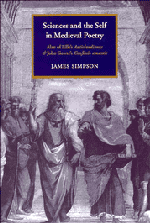 Sciences and the Self in Medieval Poetry
Sciences and the Self in Medieval Poetry Book contents
- Frontmatter
- Contents
- Acknowledgements
- List of abbreviations
- 1 Introduction
- 2 The outer form of the Anticlaudianus
- 3 A preposterous interpretation of the Anticlaudianus
- 4 Alan's philosopher–king
- 5 Ovidian disunity in Gower's Confessio amantis
- 6 Genius's psychological information in Book III
- 7 The primacy of politics in the Confessio amantis
- 8 Poetics
- 9 Conclusion: varieties of humanist politics
- Works cited
- Index
- CAMBRIDGE STUDIES IN MEDIEVAL LITERATURE
4 - Alan's philosopher–king
Published online by Cambridge University Press: 15 December 2009
- Frontmatter
- Contents
- Acknowledgements
- List of abbreviations
- 1 Introduction
- 2 The outer form of the Anticlaudianus
- 3 A preposterous interpretation of the Anticlaudianus
- 4 Alan's philosopher–king
- 5 Ovidian disunity in Gower's Confessio amantis
- 6 Genius's psychological information in Book III
- 7 The primacy of politics in the Confessio amantis
- 8 Poetics
- 9 Conclusion: varieties of humanist politics
- Works cited
- Index
- CAMBRIDGE STUDIES IN MEDIEVAL LITERATURE
Summary
INTRODUCTION
In a fascinating aside to his exposition of the involucra of pagan philosophers in the Theologia Christiana (1122–7), Abelard registers a possible objection from his critics. He has argued that pagan philosophical fables are foreshadowings of Christian truth; so, he imagines, his detractors will accuse him of having distorted the real, historical sense of pagan integumenta in order to make them conform to Christian orthodoxy:
If, however, anyone should object that I am an unfit and destructive expositor, by arguing that I have twisted the words of the philosophers to agree with our faith by an exceedingly poor interpretation, and that I have imposed meanings on them which they did not intend at all…
Si quis autem me quasi importunum ac violentum expositorem causetur, eo quod nimis improba expositione ad fidem nostram verba philosphorum detorqueam et hoc eis imponam quod nequaquam ipsi senserint…
He goes on to answer the charge by saying that the philosophers spoke better than they knew, unknowingly inspired by the Holy Spirit. I relate this hermeneutic reflection here because I feel open to the same criticism as Abelard: just as he thinks that he might be accused of twisting the sense of the texts he interprets in order to make them conform to a present orthodoxy, so too, it could be argued, does my interpretation of the Anticlaudianus adjust the literal sense of the poem to make it square with an orthodoxy.
- Type
- Chapter
- Information
- Sciences and the Self in Medieval PoetryAlan of Lille's Anticlaudianus and John Gower's Confessio Amantis, pp. 92 - 133Publisher: Cambridge University PressPrint publication year: 1995


